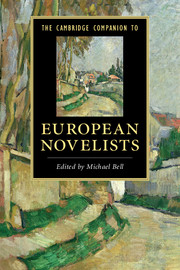Book contents
- Frontmatter
- Introduction: The novel in Europe 1600–1900
- 1 Miguel de Cervantes (1547–1616): Don Quixote: romance and picaresque
- 2 Daniel Defoe (1660–1731): Journalism, myth and verisimilitude
- 3 Samuel Richardson (1689–1761): The epistolary novel
- 4 Henry Fielding (1707–1754): The comic epic in prose
- 5 Jean-Jacques Rousseau (1712–1778): The novel of sensibility
- 6 Laurence Sterne (1713–1768): The fiction of sentiment
- 7 Johann Wolfgang von Goethe (1749–1832): The German Bildungsroman
- 8 Walter Scott (1771–1832): The historical novel
- 9 Stendhal (1783–1842): Romantic irony
- 10 Mary Shelley (1797–1851): The Gothic novel
- 11 Honoré de Balzac (1799–1850): ‘Realism’ and authority
- 12 Charles Dickens (1812–1870): Englishman and European
- 13 George Eliot (1819–1880): Reality and sympathy
- 14 Gustave Flaubert (1821–1880): Realism and aestheticism
- 15 Fyodor Dostoevsky (1821–1881): ‘Fantastic realism’
- 16 Leo Tolstoy (1828–1910): Art and truth
- 17 Émile Zola (1840–1902): Naturalism
- 18 Henry James (1843–1916): Henry James's Europe
- 19 Marcel Proust (1871–1922): A modernist novel of time
- 20 Thomas Mann (1875–1955): Modernism and ideas
- 21 James Joyce (1882–1941): Modernism and language
- 22 Virginia Woolf (1882–1941): Re-forming the novel
- 23 Samuel Beckett (1906–1989): Language, narrative, authority
- 24 Milan Kundera (1929–): The idea of the novel
- Conclusion: The European novel after 1900
- Further reading
- Index
- Cambridge Companions To …
14 - Gustave Flaubert (1821–1880): Realism and aestheticism
Published online by Cambridge University Press: 28 September 2012
- Frontmatter
- Introduction: The novel in Europe 1600–1900
- 1 Miguel de Cervantes (1547–1616): Don Quixote: romance and picaresque
- 2 Daniel Defoe (1660–1731): Journalism, myth and verisimilitude
- 3 Samuel Richardson (1689–1761): The epistolary novel
- 4 Henry Fielding (1707–1754): The comic epic in prose
- 5 Jean-Jacques Rousseau (1712–1778): The novel of sensibility
- 6 Laurence Sterne (1713–1768): The fiction of sentiment
- 7 Johann Wolfgang von Goethe (1749–1832): The German Bildungsroman
- 8 Walter Scott (1771–1832): The historical novel
- 9 Stendhal (1783–1842): Romantic irony
- 10 Mary Shelley (1797–1851): The Gothic novel
- 11 Honoré de Balzac (1799–1850): ‘Realism’ and authority
- 12 Charles Dickens (1812–1870): Englishman and European
- 13 George Eliot (1819–1880): Reality and sympathy
- 14 Gustave Flaubert (1821–1880): Realism and aestheticism
- 15 Fyodor Dostoevsky (1821–1881): ‘Fantastic realism’
- 16 Leo Tolstoy (1828–1910): Art and truth
- 17 Émile Zola (1840–1902): Naturalism
- 18 Henry James (1843–1916): Henry James's Europe
- 19 Marcel Proust (1871–1922): A modernist novel of time
- 20 Thomas Mann (1875–1955): Modernism and ideas
- 21 James Joyce (1882–1941): Modernism and language
- 22 Virginia Woolf (1882–1941): Re-forming the novel
- 23 Samuel Beckett (1906–1989): Language, narrative, authority
- 24 Milan Kundera (1929–): The idea of the novel
- Conclusion: The European novel after 1900
- Further reading
- Index
- Cambridge Companions To …
Summary
If it is the case, as Milan Kundera once stated, that ‘every novelist's work contains an implicit vision of the history of the novel, an idea of what the novel is’, there can be no more exemplary illustration of that truth than the work of Gustave Flaubert. Supremely preoccupied with style and with the refinement of techniques handed down by previous generations, Flaubert heralds a new era of self-consciousness in the novel. As he hones his texts through many drafts in the solitude of the family home at Croisset, near Rouen, he pursues his reflection on literatures ancient and modern on a daily basis, wresting his own fictions from a truly vast programme of reading. At the same time, he scrutinises the complexities of narrative with a new intensity, and contemplates his own place within the literary tradition. Prose, he writes to his mistress Louise Colet on 24 April 1852, is the modern form of writing par excellence, replacing the ancient and established literary form, poetry: ‘Prose was born yesterday … All the combinations of poetry have been tried out, but as for prose, far from it.’ Flaubert's sense of his own mission and modernity as a writer is manifest throughout his exceptionally readable correspondence. ‘Before Flaubert’, writes the Peruvian novelist Mario Vargas Llosa, ‘novelists sensed intuitively that form played a key role in the success or failure of their stories … But only after Flaubert does this spontaneous, diffuse and intuitive idea become rational knowledge, theory, artistic consciousness.’
- Type
- Chapter
- Information
- The Cambridge Companion to European Novelists , pp. 244 - 258Publisher: Cambridge University PressPrint publication year: 2012



